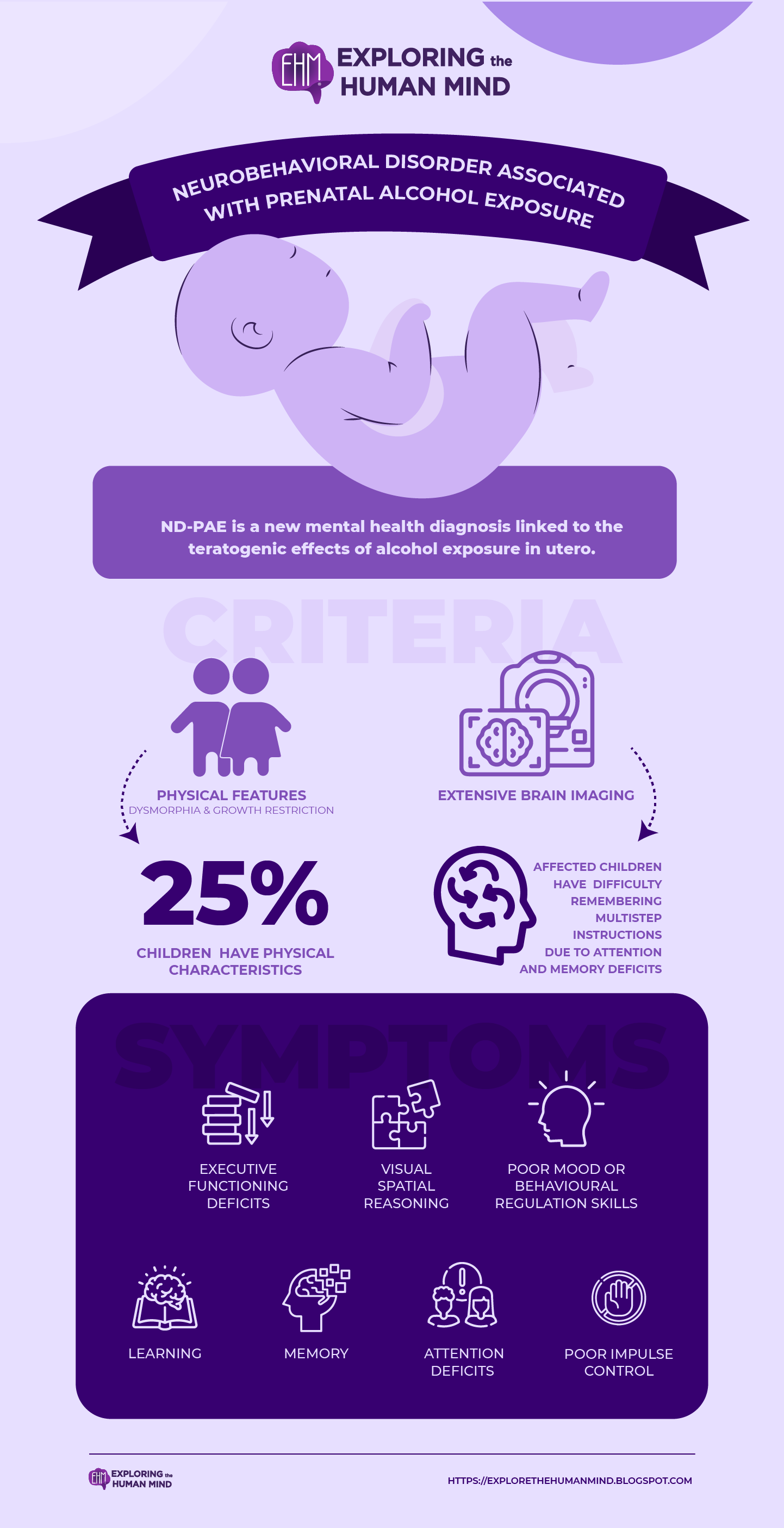Neurobehavioral Disorder Associated with Prenatal Alcohol Exposure ND-PAE
Despite the absence of physical features (such as dysmorphia and growth restriction), the criteria for ND-PAE are based on extensive brain imaging and animal model studies of the adverse effects of prenatal alcohol exposure. In fact, only 25% of children affected by in-utero alcohol exposure have physical characteristics.
The Coordinating Committee on Fetal Alcohol Spectrum Disorders, the National Institute on Alcohol Abuse and Alcoholism, and the Centers for Disease Control and Prevention convened a panel of experts in 2011 to evaluate research on FASDs not associated with typical physical features.
According to the DSM-5, the brain damage caused by ND-PAE affects every aspect of the developing child's functioning. Because brain damage is irreversible and permanent, legal intervention requires recognizing the symptoms of ND-PAE and providing external support in a structured environment to compensate for the individual's deficits. Affected youth have significant difficulty remembering multistep instructions due to attention and memory deficits. Coping with change is difficult for children with ND-PAE, according to the DSM-5, because each new context necessitates learning new behavioral routines. In these situations, the child with ND-PAE becomes cognitively overwhelmed.
Children with ND-PAE tend to be developmentally delayed in adaptive functioning, including social, practical, and language skills, due to multiple cognitive deficits. Deficits in attention, language, memory, and executive function may also have a negative impact on legal competencies. According to the DSM-5, the social development delays that are common in ND-PAE make it difficult for these individuals to establish and maintain relationships. Moral maturity is affected by developmental delays in socialization. Most adults with FASD behave socially and emotionally like very young children, especially in unfamiliar situations where appropriate behavior has not been practiced or well learned.

vectors by Freepick; graphic design by Vadot
Facts
Some people's intellectual abilities may be deficient, but not the majority. Executive functioning deficits, learning, memory, and visual spatial reasoning are all common.
Impaired self-regulation can manifest as poor mood or behavioural regulation skills, attention deficits, and poor impulse control. They are distinguished by arousal dysfunction, which includes slower gating of incoming stimulation and a decreased capacity to inhibit attending to distracting stimuli. They respond to sensory input simplification (fewer distractions and slower presentation).
Adaptive functioning skills frequently fall below their overall IQs, and there are often declines in their skills as they grow older in comparison to their peers. This decline may result in lower standard scores as they age. They frequently have poor pragmatic communication skills, are socially disinhibited, and have poor motor skills or coordination, with the latter being a greater deficit in young children rather than older children.
Individuals with ND-PAE typically struggle with nonverbal aspects of cognition such as visual-motor skills, learning and memory for newly learned skills, and executive functioning, resulting in behavioural issues.Cognitive impairment combined with behavioural issues should prompt clinicians to consider ND-PAE diagnosis.
Reference:
Neurobehavioral Disorder Associated with Prenatal Alcohol Exposure DSM-5 - Therapedia. (2014). Theravive.com. https://www.theravive.com/therapedia/neurobehavioral-disorder-associated-with-prenatal-alcohol-exposure-dsm--5
Hagan, J., Balachova, T., Bertrand, J., Chasnoff, I. J., Dang, E. P., Fernandez-Baca, D., Kable, J. A., Kosofsky, B. E., Senturias, Y., Singh, N., Sloane, M. A., Weitzman, C., & Zubler, J. (2016). Neurobehavioral Disorder Associated With Prenatal Alcohol Exposure. 138(4). https://doi.org/10.1542/peds.2015-1553
Sanders, J. O., Netelenbos, N., & Samuel Ofori Dei. (2020). Construct and factorial validity of Neurobehavioral Disorder associated with Prenatal Alcohol Exposure (ND-PAE). 8(1). https://doi.org/10.1186/s40359-020-00405-5






Comments
Post a Comment